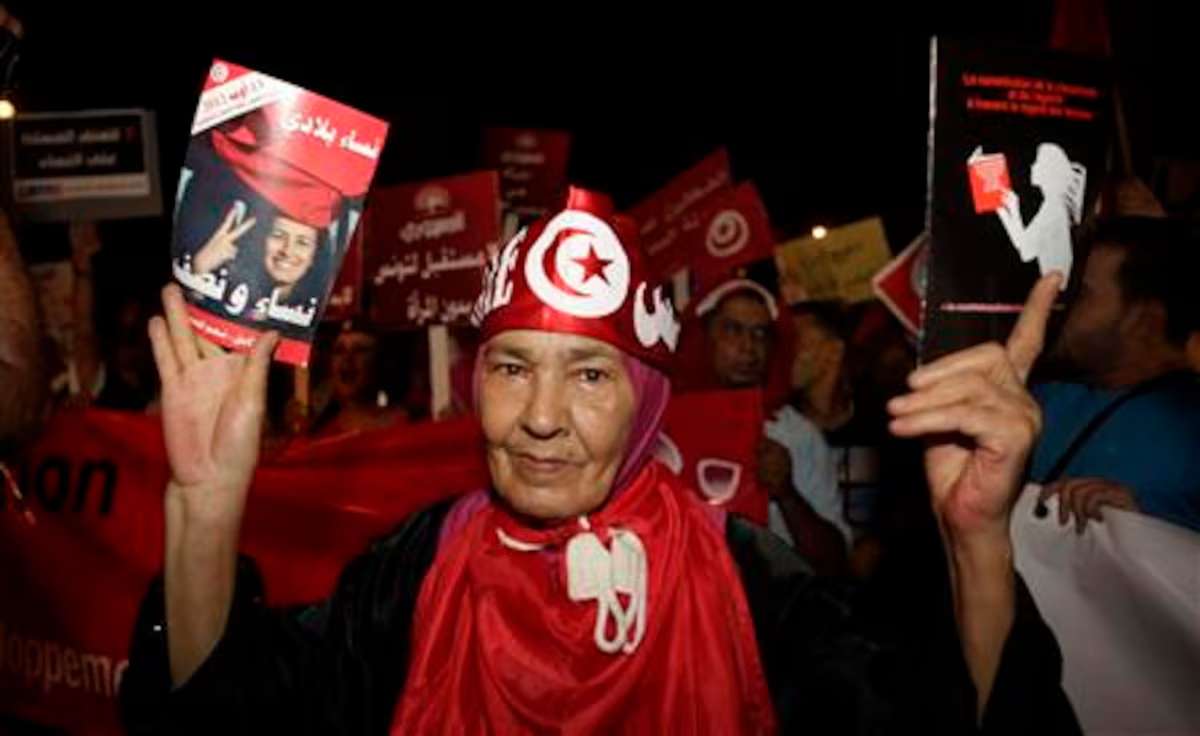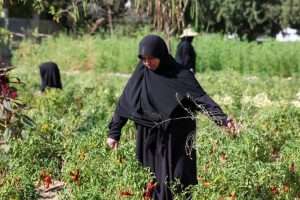Tunisia is erasing the women’s rights it once championed

Once hailed for its progressive gender policies, Tunisia is now slipping back into the shadows, quietly erasing the very women’s rights it once championed.
The situation for women in Tunisia will remain unchanged if world leaders continue to sit and ponder at the fact that it could be worse, using the gender apartheid in Afghanistan to support their claims. But in Tunisia, despite being influenced by the Sunni Maliki Islamic tradition, Sharia law still anchors the country’s debates on women’s rights.
It has been almost 70 years since Tunisia gained independence and started to evolve its image as a regional champion of women’s rights. In 1956, President Habib Bourguiba provided women with a personal statusguided by universal human rights principles. Polygamy was outlawed and marriage by mutual consent was introduced.
The second wave of gender reform came in the 1990s. Under the rule of President Zine El-Abidine Ben Ali, Tunisia saw the establishment of the Women’s and Family Affairs Ministry, together with the Centre for Studies, Documentation, and Information on Women (CREDIF). These institutions were instrumental in advancing women’s roles in public life, developing their rights and promoted a call for gender equality.
“If I didn’t have kids, I would live on the street for all I care.”
It wasn’t until the Arab Spring uprisings, and the reforms that followed, that women and men were officially recognised as equal citizens in Tunisia.
Women activists and politicians were making moves in 2017, spearheading progressive laws that tackled violence against women and helped pass legislations that recognised marital rape and political violence. Law-58 was implemented to stop rapists’ marriage to the survivor and held the government accountable for supporting survivors’ well-being through various programs. That same year, Muslim women also secured their right to marry non-Muslim men.
At one point, in 2018, Tunisia’s gender equality figures were well above US statistics. In the 2018 local election, women represented around 30% of parliament over four full terms and held 42% of city council positions.
In 2021, Tunisians earned their first female Prime Minister. Hallelujah!
But, after the country had made headlines with its pursuit of gender equality, these so-called “feminist policies” seemed to stop.
As we see in most “progressive” countries, the 2017 violence against women laws have been partially implemented and have therefore failed to protect women. One 40-year-old Tunisian woman told Human Rights Watch (HRW) “If I didn’t have kids, I would live on the street for all I care.”

The woman said that she has been regularly beaten and sexually abused by her husband for years, but with two children to think about, still lives with him. Out of the 30 women interviewed by HRW, the majority pointed at financial dependency as a major obstacle to escaping abusive partners.
For survivors of rape and other forms of abuse, shelters and services are scarce and financial support for survivors is hard to find. Not only have women’s protection laws proven to be futile, but the constitution has also been interfered with and many references to gender equality have been rooted out.
Just in time for the 2022 legislative elections, the state also removed gender quotas – rules or policies that make sure a certain number of spots are filled by a specific group, like women. The number of female voters has significantly dropped, and women have reported being harassed at polling stations.
Qur’anic inheritance laws are another major obstacle that restrict women’s ability to flee violent husbands or male relatives – especially in areas with limited government support.
Rafik Khouri, an expert on women’s land rights in Muslim-majority countries, argues that these inheritance laws have been corrupted to deprive women of their inheritance to keep them financially dependent on their fathers and brothers. This patriarchal system only makes it harder for women to own land around the world. Khouri explains that, in the 7th Century, Islamic Law (Sharia) granted women the right to own, inherit, buy, and sell property in their own names and therefore the current inheritance laws should not exist in legal structures today.
If Tunisia truly want to improve the situation for women, while reforming its security sector, it needs to start by examining its restrictive policies and listening to those on the ground. Every democracy faces messy transitions and Tunisia is no exception. But within that turbulence lies opportunity: openings to push for greater women’s rights.
Just this week, on August 13th, feminist activists gathered in Tunis for a protest on National Women’s Day. The rally demanded the release of Abir Moussi, the leader of the Free Destourian Party, who was arrested by the Tunisian authorities in October 2023.
Who better to define women’s needs than women themselves? Tunisia is home to politically savvy feminists who already know what’s at stake and it’s time the world took them seriously.
Feminists to follow in Tunisia:
- Ikram Ben Said, the founder of Aswat Nisaa (Women’s Voices), a leading Tunisian feminist organisation.
- Tharwa Boulifi, an 18-year-old feminist writer and activist.
- Fatma Zahra Delly, an activist and social worker promoting women’s rights and social justice.
- Aya Chebbi, a feminist and diplomat known for empowering young girls across Africa.
- Soumaya Mestiri, a philosopher and writer who advocates for the decolonization of feminism in Tunisia.
- Nabila Hamza, a sociologist and gender expert, co-founded the Tunisian Association of Democratic Women (ATFD).
The views expressed in this article belong to the author and do not necessarily reflect the editorial policy of Maghrebi.org. Danielle Summer is a freelance foreign correspondent specialising in women’s rights and foreign affairs. You can follow her on Bluesky: @ daniellesummer.bsky.social
If you wish to pitch an opinion piece please send your article to grace.sharp@maghrebi.org
Want to chase the pulse of North Africa?
Subscribe to receive our FREE weekly PDF magazine













